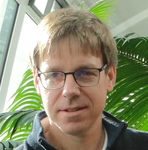
WHITE Olivier
- INSERM - U1093 Cognition, Action, and Sensorimotor Plasticity, Universite de Bourgogne, Dijon, France
- Behavioral/Cognitive Neuroscience, Computational modeling
- recommender
Recommendations: 0
Reviews: 0
Areas of expertise
Educational
Olivier White completed his master in Computing Civil Engineering at Université catholique de Louvain (UCL, Belgium, 2000). Then, he worked in the Rehabilitation Unit (medicine faculty, UCL) as a software and hardware engineer to create an experimental platform dedicated to measuring human motor adaptation in altered gravitational environments. His PhD, conducted at the Systems and Control lab (Louvain School of Engineering, Belgium), focused on the role of gravity in the control of dexterous manipulation. Between 2007 and 2009, he was a post-doctoral fellow at Bangor University (UK) to investigate motor control in redundant systems (advisor: Dr. Jörn Diedrichsen). Then, Olivier White worked for 18 months at the European Science Foundation (Strasbourg, FR) to coordinate research actions, manage projects in the Space domain and coordinate international peer-review activities for scientific proposals dedicated to the International Space Station and ground-based facilities. Olivier White is PI and co-PI of several international networking and scientific projects (e.g. ESA-funded delta-g Topical Team). Olivier White is now an associate professor in Computational Neuroscience at Université de Bourgogne and INSERM (Dijon, FR). He was awarded a “Chaire d’Excellence” fellowship for 7 years (120 000€). He supervised 20 master theses (some led to publication) and one PhD student. His main research interests are devoted to motor control and learning. These research questions are addressed through a complementary set of techniques such as haptics, 3d virtual reality, object manipulation, neuroimaging, altered gravity environments and hand and eye movements. Olivier White also develops new projects that aim at translating basic mature research into society. Since 2017, he is Honorary Senior Lecturer at University of East Anglia which provides an ideal context to pursue his collaborative work.
Research
My research interests, in the broad field of neuroscience, are centred on motor control and learning using various techniques and from different theoretical view angles, therefore fostering many multidisciplinary collaborations. To understand how the brain controls actions as diverse as reaching movements, dextrous manipulation or locomotion, the central nervous system must be challenged. By adopting 3D virtual reality and haptic devices or even gravitational changes (centrifuges, parabolic flights), I demonstrate the flexibility of our brain to adapt behaviour in many environments, including those never experienced. These investigations raise basic questions such as what are the relevant sensory information that drive learning, how do we generalize and consolidate motor skills, why do we choose one specific motor strategy among an infinite repertoire, how does inherent variability in the perception-action chain benefit control? I address these questions using regular techniques (motion tracking systems, force measurements, accelerometry,
electromyography and fMRI) but also parabolic flights, human centrifuges and advanced modeling approaches (optimal control, stochastic resonance and fractal analyses). My goal is to build a thriving research laboratory that uses multiple approaches, including behavioural, neuroimaging and mathematical methods, to better understand how the brain plans and execute movements with the hope to develop applications. I am pursuing this endeavour through collaborations and by actively involving Msc and PhD students.